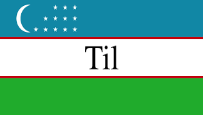The given article focuses on the problem of borrowing vocabulary in the Uzbek language with respecting to the historical perspective. The formation of the language composition, the main stages of which are described in this article, began in the Ancient period and continues in the Present day. Special emphasis is made on the effects of Persian, Arabic, Russian and English languages, as well as Uzbekization of borrowings. Cultural and social antecedents of this process are discussed.
Introduction
The Uzbek language — Kipchak-Karluk branch of the Turkic languages has an identical history that developed under the influence of the great cultures and civilizations. The geographical location inevitably determined the role of Uzbekistan as the intermediary between the East and the West in one or another historical period, which explains the presence of borrowings from many languages.

The goal of the current article is to reveal the stages of the borrowing in the Uzbek language, the result and impact of borrowing, and the peculiarities of the borrowed words.
Main part
1. Ancient period: holding it in its contact with Iranian languages
The first_ borrowings into Uzbek began in prehistoric times when ancestors of modern Uzbeks had direct contact with Iranian speaking tribes. The source mentioned here was the influence of the Sogdian language, which was established as the mediator of the business and lucrative affair on the Silks Roads.
Examples of borrowings:
Nav (new), Shahr (city).
These words are still a part of the language and in fact are used in people’s day to day speech.
2. Medieval period: Arabic and Persian influence
A process of borrowing from the Arabic language started in large scale when Islam started its spread in the 8th century. These enlightened areas include religious, sciences and literary aspects The influence that was brought by the enlightening was religious in science and literary. The borrowed words mainly related to religious terminology, science and culture:
Ilm (science), Kitob (book), Dunyo (peace, world).
At the same time, the importance of the Persian language enlarged, and this fact can be explained by the historical connection with Iran. Persian borrowings enriched the Uzbek language with words related to literature, art and everyday life:
Gul (flower), Devor (wall), Mehr (love, kindness).
3. Colonial period: the role of Russian as an important factor
The earliest period of Uzbek writing is associated with the annexation of Central Asia to the Russian Empire in the nineteenth century the Uzbek language felt a strong pressure from Russian. This process was particularly on the high gear during the soviet period when Russian was established as a medium of inter-ethnic communication.
Russian borrowings covered almost all spheres of life:
Politics: Council, Deputy.
Technology: Telephone, Tractor.
Everyday life: Teapot, Saucepan.
Russian words were often adapted to Uzbek phonetics and morphology, for example:
Parta → Partada (on the desk),
Gazeta → Gazetkhon (reader of a newspaper).
Modern period: globalization and the modern media-English language
In the process of globalization in the 21 st century the influences of English as a foreign language start to appear in the Uzbek language in the sphere of technology and economical terminologies and popular culture. The greatest source of borrowdings comes from the IT field, marketing and the postmodern art.
Examples of Anglicisms:
Computer, Marketing, Chat.
It is possible to say that all these words widely spread in the youth conversation and in the professional discourse.
5. Adaptation of borrowings
Borrowed words in the Uzbek language undergo phonetic and morphological adaptation:
Phonetic: words change with the composition of the sound of the Uzbek language. For instance, the English manager became menezher.
Morphological: in front of which adding Uzbek suffixes, for example, marketingchi (marketing specialist).
Semantic transformation also occurs: According to the article, it can be concluded that borrowed words may change meanings. For example, the cognition of the meaning of the word in the Uzbek language might be different from that in the Russian language in some cases of using word problem.
6. Social and cultural aspects
Lending seems to convey both linguistic phenomenology and social transformation. For instance, utilisation of many Russian terms during the Soviet era was an index of the political power. In the modern period, Anglicisms are associated with status and ties with the world populace.
However the process of borrowing also brings out criticism. People take position to truer that license is hone to the deterioration of the utilization of servants or the enhancement of Foreign words to the fix of the Uzbek linguistic identification.
Conclusion
Loan words remain highly significant in processes of the gradual development of the Uzbek language revealing cultural contacts and filling its lexical repertoire. From the influence of the Sogdians to the trend of Anglicisms in the contemporary language — it was the result inevitable of contacts with other nations.
On the other hand, the authorities should avoid overborrowings and protect national linguistic identity as well. Linguists’ primary duty is to govern the borrowing process, in an attempt to balance the further evolution of the language.
References:
- Махмудов Н. «История узбекского языка». Ташкент, 2020.
- Ахмедов Ш. «Арабские и персидские заимствования в узбекском языке». Ташкент, 2018.
- Каримов Ф. «Русские заимствования в узбекской лексике». Ташкент, 2015.
- Hasanov B. «English Influence on Modern Uzbek Lexicon». Tashkent, 2022.

